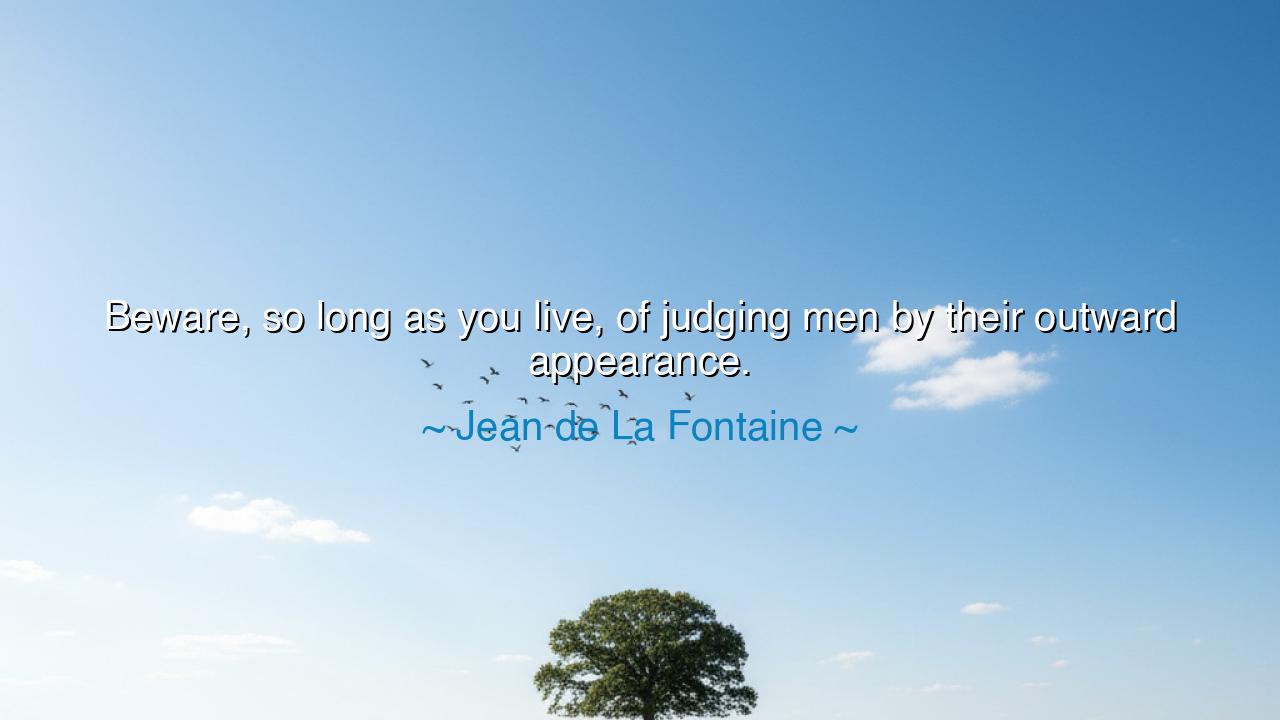
Beware, so long as you live, of judging men by their outward






"Beware, so long as you live, of judging men by their outward appearance." These wise words, spoken by the great Jean de La Fontaine, echo through the corridors of time, urging us to look beyond the superficial and to recognize the deeper truths that lie within every individual. In an age where the external often becomes the primary basis for judgment—where the clothes we wear, the status we hold, and the outward signs of success or failure shape how we are perceived—La Fontaine calls upon us to remember that true worth is not found in appearance, but in character, actions, and the minds of those we encounter. His warning is both a reflection on the fallibility of human nature and a call to recognize the value that lies beyond the surface.
The ancients too, in their wisdom, spoke often of the dangers of judging by outward appearances. The Greeks, in particular, revered the philosopher and the soul as the true measure of a person's worth. Socrates, for instance, despite his humble appearance—often described as disheveled and unkempt—was regarded as one of the most profound thinkers of his time. His teachings on truth and virtue resonated far more deeply than his physical appearance ever could. And yet, many who passed by him on the streets might have dismissed him based on his unassuming exterior. The same theme resonates in Plato's works, where he often described the idea of the soul as being far more important than any outward manifestation of beauty or wealth. To look at the surface was to miss the true essence of the person.
La Fontaine’s caution is echoed in one of the most enduring stories of history: the tale of King Midas. It is said that Midas, whose outward appearance was one of opulence and power, desired more than anything to turn everything he touched into gold. When granted this wish, he soon found that his outward wealth brought him nothing but misery. His touch, once a symbol of prosperity, turned his food, his loved ones, and even his daughter into lifeless gold. The moral of the story reminds us that wealth and appearance can deceive us into thinking we possess all we need, but the true treasures of life lie beyond the gold and jewels. Like Midas, many are blinded by the surface, missing the deeper gifts of love, wisdom, and fulfillment that are not measured in wealth or appearance.
In the modern world, this lesson remains ever-relevant. Consider the story of Albert Einstein, whose disheveled hair and somewhat absent-minded appearance belied his genius. In his early years, he struggled to find employment, not because of his intelligence, but because many could not see past his exterior. It was only through his ideas, his insight, and his innovations that the world would come to recognize him as one of the greatest minds of the 20th century. Einstein’s story is a perfect modern-day reminder that what we see on the outside can often be a poor indicator of a person's true potential and worth. It is a lesson that can be applied in every facet of our lives: in how we view others, in how we judge those around us, and in how we reflect upon ourselves.
La Fontaine’s quote also touches upon the timeless human tendency to compare. From the earliest days of human existence, people have been prone to measuring others by superficial traits: beauty, strength, wealth, and status. But the ancient wisdom of looking beyond these fleeting attributes remains the greatest counsel. When we judge others purely by what is seen, we risk dismissing their inner strength, their integrity, and their potential. The true character of a person is not something that can be easily seen—it is revealed in action, in the choices they make when no one is watching, and in their ability to love, care, and learn.
The lesson La Fontaine imparts is a profound one—it teaches us that the outward appearance is but a fleeting shell, a momentary reflection that does not define a person. True judgment lies in the soul, in the character, and in the actions of an individual. We must guard ourselves against the human instinct to see only the surface, and instead, strive to recognize the deeper truths that define the worth of others. Like the ancient philosophers, we must look beyond appearances, and in doing so, we will find the true beauty and value in both others and ourselves.
As you go forward in your life, remember this ancient truth: that the people you meet, and the ones you admire or dismiss, are more than what is visible on the surface. In your own life, let actions be your true measure. If you are faced with a judgment of someone, ask yourself: “What does their heart reveal?” Seek the inner light, the wisdom that lies beyond the physical realm. Whether in your relationships, career, or personal growth, take the time to look deeper, to see beyond what is immediately presented. When you do, you will not only find the true worth in others but also unlock the hidden treasure within yourself. True vision comes from seeing with the heart and not just the eyes.






AAdministratorAdministrator
Welcome, honored guests. Please leave a comment, we will respond soon